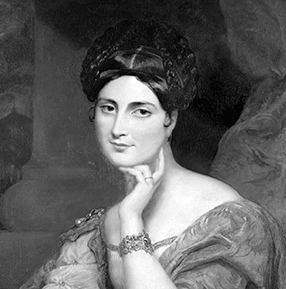CANTO I
Moonlight is o'er the dim and heaving sea,—
Moonlight is on the mountain's frowning brow,
And by their silvery fountains merrily
The maids of Castaly are dancing now.
Young hearts, bright eyes, and rosy lips are there,
And fairy steps, and light and laughing voices,
Ringing like welcome music through the air—
A sound at which the untroubled heart rejoices.
But there are hearts o'er which that dancing measure
Heavily falls!
And there are ears to which the voice of pleasure
Still vainly calls !
There's not a scene on earth so full of lightness
That withering care
Sleeps not beneath the flowers, and turns their brightness
To dark despair!
Oh! Earth, dim Earth, thou canst not be our home;
Or wherefore look we still for joys to come?
The fairy steps are flown—the scene is still—
Nought mingles with the murmuring of the rill.
Nay, hush! it is a sound—a sigh—again!
It is a human voice—the voice of pain.
And beautiful is she, who sighs alone
Now that her young and playful mates are gone:
The dim moon, shining on her statue face,
Gives it a mournful and unearthly grace;
And she hath bent her gentle knee to earth;
And she hath raised her meek sad eyes to heaven—
As if in such a breast sin could have birth,
She clasps her hands, and sues to be forgiven.
Her prayer is over; but her anxious glance
Into the blue transparency of night
Seems as it fain would read the book of chance,
And fix the future hours, dark or bright.
A slow and heavy footstep strikes her ear—
What ails the gentle maiden?—Is it fear?
Lo! she hath lightly raised her from the ground,
And turn'd her small and stag-like head around;
Her pale cheek paler, and her lips apart,
Her bosom heaving o'er her beating heart:
And see, those thin white hands she raises now
To press the throbbing fever from her brow—
In vain—in vain! for never more shall rest
Find place in that young, fair, but erring breast!
He stands before her now—and who is he
Into whose outspread arms confidingly
She flings her fairy self?—Unlike the forms
That woo and win a woman's love—the storms
Of deep contending passions are not seen
Darkening the features where they once have been,
Nor the bright workings of a generous soul,
Of feelings half conceal'd, explain the whole.
But there is something words cannot express—
A gloomy, deep, and quiet fixedness;
A recklessness of all the blows of fate—
A brow untouch'd by love, undimm'd by hate—
As if, in all its stores of crime and care,
Earth held no suffering now for him to bear.
Yes—all is passionless—the hollow cheek
Those pale thin lips shall never wreathe with smiles;
Ev'n now, 'mid joy, unmoved and sad they speak
In spite of all his Linda's winning wiles.
Yet can we read, what all the rest denies,
That he hath feelings of a mortal birth,
In the wild sorrow of those dark bright eyes,
Bent on that form—his one dear link to earth.
He loves—and he is loved! then what avail
The scornful words which seek to brand with shame?
Or bitterer still, the wild and fearful tale
Which couples guilt and horror with that name?
What boots it that the few who know him shun
To speak or eat with that unworthy one?
Were all their words of scorn and malice proved,
It matters not—he loves and he is loved!
Credit
This poem is in the public domain.
Date Published
01/01/1830

